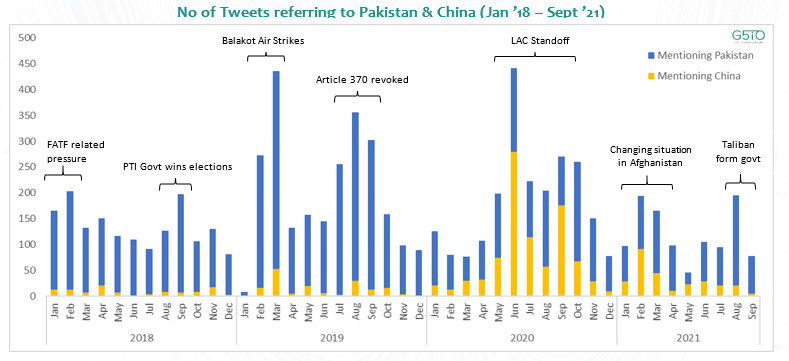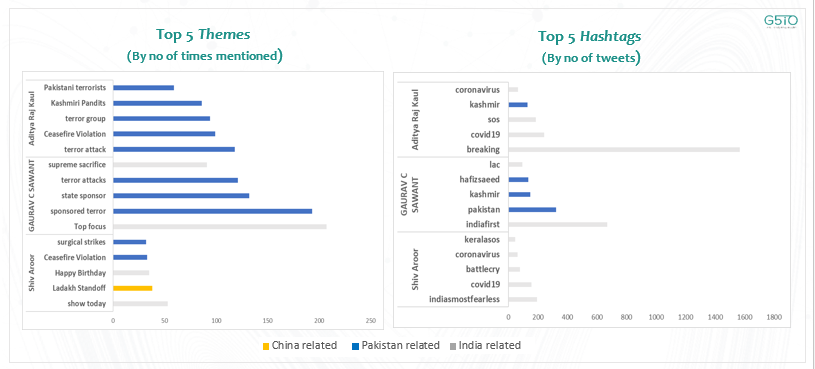Overview
- This study maps the deeply integrated and coordinated social media campaigns of Indian Info Ops networks against its regional rivals (China and Pakistan)
- It does this by examining tweets related to Pakistan and China by some of the most prominent Indian voices on Twitter: 3 Indian journalists, 4 former military experts, and 3 sock-puppet accounts
- It shows how these accounts are part of a coordinated network of verified accounts linked with key state institutions and individuals all pushing a synchronous and specific narrative targeting its neighbors
Methodology
- The data analyzed comprises over 120k tweets from the last 3 years (Jan 2018 – Oct 2021)
- Findings were derived from:
- Textual analysis of the most frequently recurring themes and hashtags specifically on Pakistan and China
- Network analysis of the most frequent interactions between key accounts and their immediate clusters
Textual Analysis
Key Findings
- There is a marked and coordinated specificity in terms of how these accounts have projected an increasingly hawkish stance on Pakistan and China
- The most prominent themes associated with Pakistan and China are related to terrorism, ceasefire/ border violations and propaganda
- Tweeting patterns related to each country were strongly correlated around the following key events:
- Hawkish statements related to Pakistan were predominantly based around the Balakot air- strikes, and the revocation of Article 370 in the disputed J&K region around 2019
- Those related to China saw a significant rise as the LAC standoff intensified over the summer of 2020
1. Defense/ Security Journalists




2. Former Military Experts




3. Sock-Puppet Accounts




Network Analysis
Key Findings
- The relationships shown below are based on a set frequency of interactions between these accounts in the form of mentions, retweets, quotes, and replies
- Each cluster represents how the above-mentioned accounts are linked with one another as well as official state accounts such as the HMO and ADG PI
- The journalists and military experts being analyzed act as conduits between official narratives at the state level (top left) and hyper nationalized hawkish stances at the sock-puppet/ info ops levels (bottom right)

Conclusion
- There has been a marked surge in Indian information warfare against Pakistan and China following the 2018 elections in Pakistan
- Much of this conversation is coordinated between different sets of networks and actors used to amplify the Indian state’s official narrative into increasingly hyper-nationalistic rhetoric
- The narratives being pushed are centered on framing Pakistan as a state sponsor of terror, and China as a hegemonic aggressor in the South Asian region
Download PDF:

Mapping Network Behavior and Coordinated Activity – A Study on Indian Info Ops
